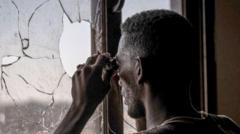Lina Ishaq's case highlights the ongoing ramifications of IS crimes and the pursuit of justice for minority communities affected by the group.
**Swedish Woman Sentenced to Prison for Genocide Against Yazidis Amid IS Crimes**

**Swedish Woman Sentenced to Prison for Genocide Against Yazidis Amid IS Crimes**
A Swedish court has convicted a woman for her involvement with Islamic State, marking a significant legal precedent for Yazidi victims.
In a landmark ruling, a Swedish woman named Lina Ishaq has been sentenced to 12 years in prison for her involvement in genocide and war crimes against the Yazidi community while she was a member of the Islamic State (IS) in Syria. Ishaq, 52, was convicted after it was revealed that she held three Yazidi women and six Yazidi children as slaves in Raqqa from 2014 to 2016. This marks the first prosecution of IS's actions against the Yazidis, a group subjected to grievous persecution during the group's rise in power.
The Stockholm District Court emphasized Ishaq's significant role in the widespread enslavement system that IS established for Yazidi women and children. Presiding judge Maria Ulfsdotter Klang noted that Ishaq's independent actions included forcing her captives to wear veils, practicing Islamic customs, and subjecting them to physical violence. Furthermore, Ishaq has previously served sentences related to her taking a small child to Syria and not preventing her son from being utilized as a soldier by IS—a militant group that later claimed his life in 2017.
The Yazidi people, an ancient religious minority primarily located in Northern Iraq, experienced a brutal genocidal onslaught beginning in August 2014, during which approximately 5,000 Yazidis were killed, and countless others were displaced. Reports indicate that upwards of 6,000 women and children were captured and trafficked by IS, with heinous acts of torture and sexual violence committed against them—actions officially recognized by the United Nations as a strategy to eradicate the Yazidi population.
Ishaq, who was born into a Christian family in Iraq but relocated to Sweden as a child, converted to Islam prior to marrying. She was among about 300 Swedish nationals, including many women, who left their homes to join IS in 2013. Following the collapse of IS's territorial control in 2017, she fled to Turkey before being extradited back to Sweden in 2020.
Following Ishaq's conviction, members of the Yazidi community in Sweden have expressed hope that such prosecutions can help restore trust between them and local authorities. According to Dawood Khalaf, chairman of the Yazidi association in Skaraborg, the indictment has changed perceptions among victims, who previously feared retaliation for cooperating with police investigations.
Despite her conviction, Ishaq's defense attorney, Mikael Westerlund, has indicated that she continues to deny the allegations and is contemplating an appeal. As the legal precedent on IS crimes evolves, the case remains a focal point for discussions about justice and accountability for genocide and war crimes against vulnerable communities.
The Stockholm District Court emphasized Ishaq's significant role in the widespread enslavement system that IS established for Yazidi women and children. Presiding judge Maria Ulfsdotter Klang noted that Ishaq's independent actions included forcing her captives to wear veils, practicing Islamic customs, and subjecting them to physical violence. Furthermore, Ishaq has previously served sentences related to her taking a small child to Syria and not preventing her son from being utilized as a soldier by IS—a militant group that later claimed his life in 2017.
The Yazidi people, an ancient religious minority primarily located in Northern Iraq, experienced a brutal genocidal onslaught beginning in August 2014, during which approximately 5,000 Yazidis were killed, and countless others were displaced. Reports indicate that upwards of 6,000 women and children were captured and trafficked by IS, with heinous acts of torture and sexual violence committed against them—actions officially recognized by the United Nations as a strategy to eradicate the Yazidi population.
Ishaq, who was born into a Christian family in Iraq but relocated to Sweden as a child, converted to Islam prior to marrying. She was among about 300 Swedish nationals, including many women, who left their homes to join IS in 2013. Following the collapse of IS's territorial control in 2017, she fled to Turkey before being extradited back to Sweden in 2020.
Following Ishaq's conviction, members of the Yazidi community in Sweden have expressed hope that such prosecutions can help restore trust between them and local authorities. According to Dawood Khalaf, chairman of the Yazidi association in Skaraborg, the indictment has changed perceptions among victims, who previously feared retaliation for cooperating with police investigations.
Despite her conviction, Ishaq's defense attorney, Mikael Westerlund, has indicated that she continues to deny the allegations and is contemplating an appeal. As the legal precedent on IS crimes evolves, the case remains a focal point for discussions about justice and accountability for genocide and war crimes against vulnerable communities.





















